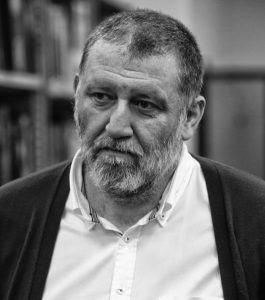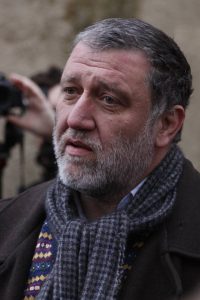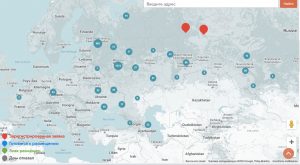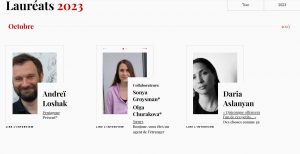 In this exclusive interview with Regard sur l’Est, Sergey Parkhomenko discusses three bold initiatives that he is spearheading and that target the academic, memory, and media landscape in Russia: the fight against academic fraud with Dissernet, the preservation of the memory of Soviet victims with Posledny Adres (Last Address), and support for independent journalists with Redkollegia.
In this exclusive interview with Regard sur l’Est, Sergey Parkhomenko discusses three bold initiatives that he is spearheading and that target the academic, memory, and media landscape in Russia: the fight against academic fraud with Dissernet, the preservation of the memory of Soviet victims with Posledny Adres (Last Address), and support for independent journalists with Redkollegia.
You are the creator and coordinator of several civic projects. Can you tell us about the Dissernet initiative’s role in Russia’s current political context?
Sergey Parkhomenko: Of course, the initiatives I coordinate are distinct, operating in various fields and pursuing multiple objectives. Let’s talk about Dissernet first. This is a community of researchers, academics, higher education teachers in Russia, journalists, and experts involved in the fight against fraud, falsification, and violations of scientific ethics, focusing on plagiarism.
Dissernet was created precisely to counter plagiarism, a practice that is unfortunately widespread in Russian academic circles, particularly at the doctoral level. In Russia, the title of “doctor” confers considerable prestige, especially in the political arena. Unfortunately, many influential figures (deputies, governors, prosecutors, judges, generals, famous entrepreneurs) hold fraudulently acquired doctorates. We have, therefore, brought together a network of researchers to sort out the real from the fake by developing automated tools while emphasizing the importance of human expertise. Nothing can ever replace human work. It is always up to the expert to decide whether a thesis is plagiarised!
How does Dissernet tackle plagiarism?
Dissernet is not limited to doctoral theses; it is also interested in scientific publications, where a lucrative copyright market exists. We also monitor publishers selling fake postgraduate theses. The Dissernet movement is based on a decentralized human network with no formal legal basis, which has enabled it to survive since 2013. Our slogan, “Where there’s no head, there’s nothing to be snatched,” reflects this decentralized structure, making it difficult for any targeted attack from the powers.
The founders of Dissernet are identified, but the network’s experts remain anonymous. Each new expert report published increases our number of opponents, those who hate us. However, once the expert reports have been published, we systematically initiate official procedures to contest the fraudulent titles with academic bodies. Most of the time, our actions result in the annulment of titles derived from plagiarised work, thus accumulating hundreds of successes in the annulment of doctoral degrees.
How would you assess Dissernet’s impact on scientific ethics in Russia?
It is significant. On our website, we publish thousands of expert reports produced by our community of scientists, exposing academic fraud, fake doctorates, and scientific publications and revealing a juicy business where people can buy the copyright to various works. We have helped to shed a harsh light on scientific ethics in Russia.
What challenges does Dissernet face in the current political climate?
The main challenge lies in our movement’s decentralized and unstructured nature. This creates obstacles in visibility and legitimacy: without a formal entity, it is difficult to participate in official discussions or influence academic reform policies. However, this anarchic structure is also our strength, as it makes it difficult for those in power to silence us.
We are determined to continue our mission to highlight violations of scientific ethics and promote academic transparency in Russia. We hope our work will help bring about significant reforms in the educational and scientific system. Although we face challenges, we believe in the power of truth and academic integrity to create a lasting impact.
Our message is clear: truth and scientific integrity are essential pillars of a prosperous society. Dissernet will continue to play its part, encouraging individual responsibility and cooperation to defend academic ethics in Russia. We are a movement of committed citizens ready to face the challenges for a more transparent and honest academic future.
 Could you describe the Posledny Adres initiative?
Could you describe the Posledny Adres initiative?
Posledny Adres began in 2014 and is part of a historical perspective, aiming to restore the memory of the victims of political repression during the Soviet period. This includes the Stalinist repressions of the 1930s-40s as well as all the others, from the Bolshevik revolution to the end of the USSR. Unlike Dissernet, Posledny Adres has registered a foundation with the Ministry of Justice. The aim is concrete: to place commemorative plaques on the facades of the houses corresponding to the last known addresses of the identified victims, thus revealing their particular history.
Posledny Adres is, of course, inspired by the European Stolpersteine program, which commemorates people persecuted by Nazism by laying ‘paving stones of remembrance.’ We share the idea of a “pixelated” commemorative monument comprising small elements scattered over a vast territory, forming a collective memorial network. What sets us apart is the specific Russian context, marked by Soviet repression.
How do you conduct your research, and what are your sources of information?
We respond to requests received via the organization’s website. Applicants often rely on family archives. Once the investigation has been launched, all kinds of sources are mobilized, from official archives to public libraries, in close collaboration with the Russian NGO Memorial (dissolved in Russia at the end of 2021, Nobel Peace Prize 2022), renowned for its commitment to studying the Soviet totalitarian past. Each plaque deposited results from in-depth research, data collection, and analysis.
What do the plates installed by Posledny Adres look like, and what negotiations are involved in the process?
Each plaque, in postcard format (11x19), contains a concise text telling the victim’s story: surname, first name, year of birth, date of arrest, cause of death, and date of rehabilitation. The texts are published on the Posledny Adres website. Placing each plaque requires negotiation with the building occupants, as the façade belongs to someone else. The aim is to obtain permission for the installation by clearly explaining the project’s intentions.

Plates installed by Posledny Adres (photo credit: https://www.poslednyadres.ru/)
What is the impact of this approach, and what are the reactions when you put up these plaques?
Since December 2014, we have installed 1,600 plaques in 67 towns and villages in Russia, handling more than 3,000 requests. Each plaque bears a specific victim’s testimony, helping preserve historical memory.
Support is not total. While some categorically reject Stalin’s regime, others want to turn the page and avoid talking about the USSR. Some are suspicious, doubting the innocence of the victims. Since the start of the war in Ukraine, the initiative has become the target of massive attacks from both “whites” and “reds,” to use the terminology of the Russian Revolution, using a variety of arguments to call the project into question. The initiative is facing acts of vandalism on an unprecedented scale, highlighting the complexity of memory issues in Russia. The war has created a hostile environment where contradictory arguments are emerging.
Nevertheless, we remain committed to continuing this work to preserve collective memory and promote reflection on state responsibility and the value of human life. Posledny Adres remains resilient in its commitment to historical truth and plays a crucial role in opening up historical debate, offering concrete testimony about the victims of Soviet repression.

Map of plates installed (photo credit: https://www.poslednyadres.ru/)
Can you tell us about the Redkollegia initiative?
Redkollegia is an informal network of journalists. It all started with an independent prize project initiated in 2016 by the Zimine family to support independent journalists. Each month, three winning journalists receive an envelope of $10,000 in total, with a focus on investigative reporting, significant stories, and great interviews. The prize never rewards opinion pieces, columnists, or editorialists.
The prize provides significant financial support to independent journalists and highlights their investigative and reporting work. Despite the growing number of Russian journalists forced into exile due to political pressure, the prize continues to exist.
How do you identify the journalistic works that you distinguish?
Redkollegia has set up a monitoring mechanism to collect the best journalistic work on Russia. This titanic process enables the jury to select winners every month. In addition to the prize, this activity has given rise to a community of independent Russian journalists organizing conferences, symposiums, and seminars. This community has become one of the largest of non-state-controlled Russian journalists.

Photo credit: https://redkollegia.org/laureates.
How is Redkollegia coping with the growing political pressure?
Many journalists, including the founder of Redkollegia, have been forced into exile. For my part, I left Russia in April 2021, when searches were raining down on my entourage. My work as a journalist led to several arrests and interrogations. I finally decided to leave, and I haven’t been able to return to Russia since. I had my program, “The Essential Facts,” live on the free Ekho Moskvy (Echo of Moscow) for over 19 years. The radio station was closed down shortly after the outbreak of war.
Since 2016, Redkollegia has persisted, continuing to award prizes and broadening its impact by creating a dynamic community of independent journalists. The idea of setting up an NGO is also being explored to strengthen the initiative’s impact further and consolidate this unique space for journalism professionals, enabling them to exchange views on the specific difficulties of their profession. The current challenges are faced collectively, notably the exile of certain members. The conferences, symposia, and seminars organized by Redkollegia are essential forums for addressing these issues and strengthening solidarity within the community.
Despite the obstacles, Redkollegia will continue to be a driving force in promoting news journalism in Russia, fostering independence and freedom of expression in journalism. Our message is one of perseverance.
Thumbnail: Sergey Parkhomenko.
* Assen Slim is an economist and professor of international economics (INALCO). Blog
Link to the French version of the article
To cite this article: Assen SLIM (2024), “Struggle, memory, and resistance: the fights of Sergey Parkhomenko,” Regard sur l’Est, 1 January.
